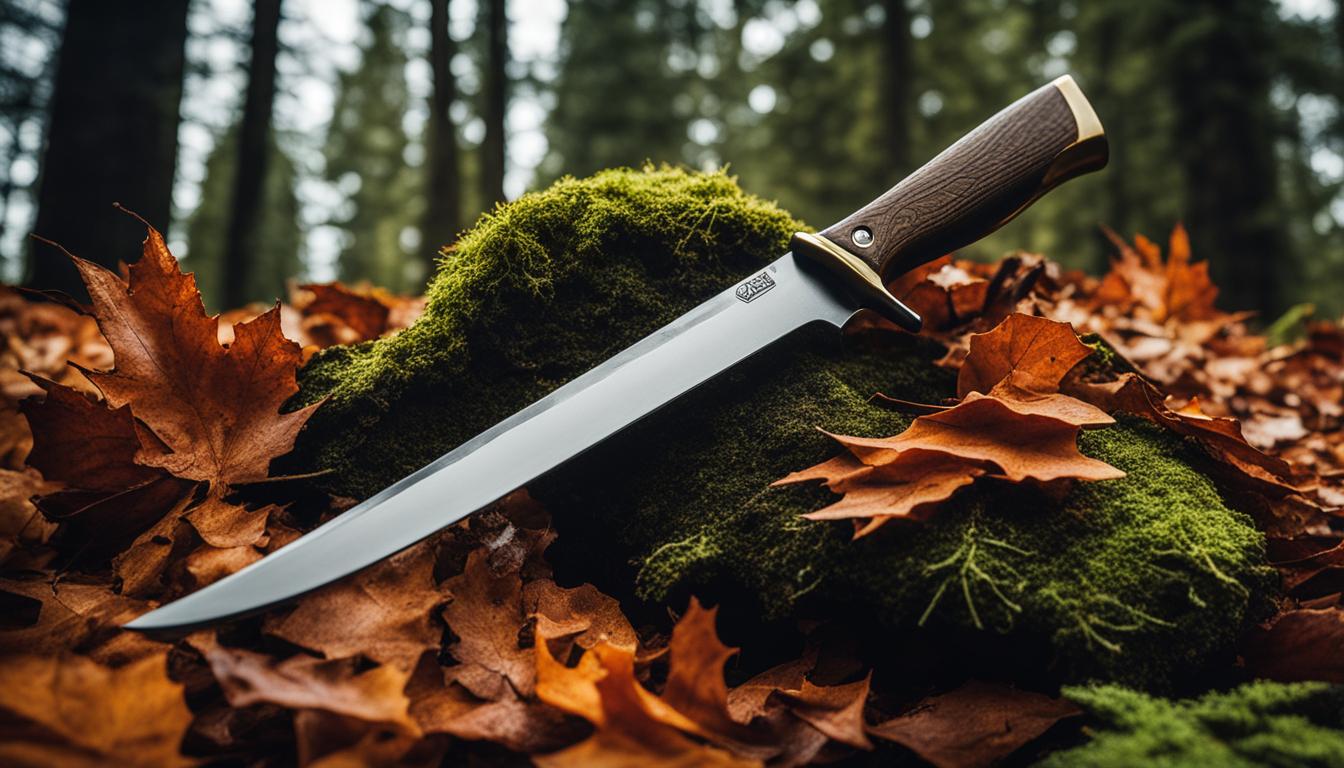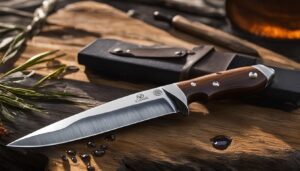Rust is a natural process that can occur on any steel, including hunting knives. Whether you have a carbon steel or stainless steel blade, proper cleaning and maintenance are crucial to prevent rust. In this guide, I will provide you with essential tips for knife rust prevention, so you can keep your hunting blade rust-free for longer.
Key Takeaways:
- Regular cleaning and drying after use is essential to prevent rust formation.
- Applying a protective coating, such as a high-quality blade wax, can help keep moisture at bay.
- Proper storage in a dry environment is crucial to avoid exposure to harsh conditions.
- Avoid using carbon steel knives in saltwater applications, as saltwater accelerates rust formation.
- Choosing the right oil, like MKC blade wax, can provide additional rust protection.
Understanding Rust and Corrosion in Steel
Rust is a common occurrence on steel surfaces when they come into contact with moisture and air. It is a reddish-brown oxidation that can compromise the integrity of the steel if left unchecked. To prevent rust formation, it is crucial to understand the factors that contribute to its occurrence.
Several factors affect rust formation in steel. Exposure to moisture and air accelerates the oxidation process, leading to the formation of rust. Improper storage or handling, especially in humid environments or in the presence of contaminants, can also contribute to rust development. The composition of the steel itself plays a role, with some types being more prone to rust than others. Harsh chemicals, extreme temperatures, and lack of regular cleaning and maintenance further increase the risk of rust formation.
One specific type of steel that is often associated with rust resistance is Damascus steel. While it is true that Damascus steel exhibits relatively high resistance to rust, it is not entirely immune. To maintain its rust-free condition, proper care and maintenance are still essential. Understanding these factors can help in implementing effective rust prevention measures and ensuring the longevity of steel products.
Rust Resistance of Damascus Steel
Damascus steel is renowned for its exceptional strength and distinctive patterns. It is made by layering different types of steel and forging them together. This combination enhances its resistance to rust and corrosion compared to other types of steel. However, Damascus steel can still rust if not properly cared for. Regular cleaning, drying, and oiling are necessary to prevent rust formation and maintain its unique beauty and durability. By following proper maintenance practices, the rust resistance of Damascus steel can be maximized.
Understanding the factors that contribute to rust formation in steel is crucial for implementing effective preventive measures. Whether it is regular cleaning and maintenance or choosing the right storage conditions, taking proactive steps can help in keeping steel products rust-free and in excellent condition for years to come.
| Factors Affecting Rust Formation | Rust Prevention Measures |
|---|---|
| Exposure to moisture and air | Proper drying and storage in dry conditions |
| Improper storage or handling | Storing in a clean and dry environment |
| Composition of the steel | Choosing rust-resistant steel types |
| Presence of contaminants in the steel | Regular cleaning and removal of contaminants |
| Exposure to harsh chemicals | Avoiding contact with corrosive substances |
| Extreme temperatures | Storing in moderate temperature conditions |
| Lack of regular cleaning and maintenance | Regular cleaning and oiling |
| Environmental conditions (high humidity, salt air, etc.) | Choosing suitable storage locations |
How To Keep Knives From Rusting
Preventing rust on knives is essential to maintain their longevity and performance. By following a few simple steps, you can keep your knives rust-free and in pristine condition.
Cleaning the Blade
After each use, it is important to clean the blade thoroughly to remove any residue or moisture that can lead to rust formation. Wash the blade with mild soapy water and a soft cloth, ensuring all debris is removed. Pay special attention to areas with food particles or acidic substances, as they can accelerate rust formation. After cleaning, dry the blade completely using a clean, dry cloth.
Applying Blade Wax
Applying a high-quality blade wax can help create a protective barrier on the knife’s surface, preventing moisture from causing rust. Look for a wax made with beeswax and Carnauba, as these natural ingredients provide excellent rust protection. Apply a thin layer of wax to the blade, making sure to cover all areas and paying extra attention to any scratches or imperfections. Buff the wax gently with a clean cloth to ensure an even distribution.
Drying the Sheath
Before storing your knife, it is crucial to ensure that the sheath is completely dry. Moisture trapped in the sheath can lead to rust formation on the blade. After cleaning the knife, remove it from the sheath and allow both the blade and sheath to air dry separately. Once dry, reassemble the knife and store it in a cool, dry place to prevent moisture build-up.
Choosing the Right Oil
Applying the right oil to your knife can provide additional rust protection. Look for oils specifically formulated for knife maintenance, such as MKC blade wax or other food-safe options. Apply a thin layer of oil to the blade, ensuring all surfaces are covered. This will help create a barrier against moisture and prevent rust formation. Remember to wipe off any excess oil before storing the knife.
Avoiding Saltwater
Saltwater can be particularly harsh on knife blades and accelerate rust formation. It is recommended to avoid using carbon steel knives in saltwater applications. If you plan to use your knife in a saltwater environment, opt for stainless steel blades, as they are more resistant to rust. Regardless of the type of steel, always rinse your knife with fresh water and dry it thoroughly after use in saltwater.
| Cleaning Tips | Rust Prevention Measures |
|---|---|
| Wash the blade with mild soapy water and a soft cloth | Apply a high-quality blade wax |
| Dry the blade completely using a clean, dry cloth | Ensure the sheath is dry before storing the knife |
| Avoid cutting acidic materials or leaving food residue on the blade | Choose the right oil for additional rust protection |
| Store the knife in a cool, dry place | Avoid using carbon steel knives in saltwater applications |
| Rinse the knife with fresh water and dry it thoroughly after use in saltwater | |
Household Ways to Remove Rust
Rust can be a persistent problem on pocket knives, but luckily there are several household items that can help remove it. These simple solutions can save you money on expensive rust remover products and keep your knives in top condition.
Using White Vinegar
White vinegar is a versatile household item that can also be used to remove rust from pocket knives. Simply soak the rusty blade in a bowl of white vinegar for a few hours or overnight. The acetic acid in the vinegar will help dissolve the rust. After soaking, scrub the blade with a toothbrush or steel wool to remove any remaining rust. Rinse the knife with water and dry it thoroughly to prevent further rusting.
Baking Soda Paste
Another effective method for removing rust is to create a paste using baking soda and water. Mix equal parts of baking soda and water until you have a thick paste. Apply the paste to the rusted areas of the blade and let it sit for a couple of hours. Then, scrub the blade with a toothbrush or steel wool. Rinse the knife with water and dry it completely.
Other Household Remedies
If you don’t have vinegar or baking soda on hand, there are other household items that can help remove rust. Rubbing a raw potato on the blade is a traditional method due to its oxalic acid content. Salt and lemon juice can also be combined to create a rust-dissolving mixture. Additionally, WD-40, a popular multi-purpose lubricant, can be applied to the rusted areas and scrubbed with a toothbrush or steel wool. Just remember to rinse the knife with water and dry it thoroughly after using these methods.
While these household remedies can be effective for removing rust from pocket knives, it’s important to note that prevention is key. Regular cleaning, proper storage, and maintenance of your knives can help prevent rust from forming in the first place. By incorporating these tips into your knife care routine, you can keep your pocket knives rust-free and ready for use.
Conclusion
In conclusion, proper care and maintenance are crucial for preventing rust on Damascus steel. To ensure the longevity and rust-free condition of this unique material, it is essential to follow a few key steps.
Firstly, storing Damascus steel in a dry place is imperative. Moisture can cause rust to form, so keeping it in a cool, dry environment is essential.
Regular cleaning is also important. Using mild soap and water, gently clean the Damascus steel to remove any dirt or debris that could potentially lead to rust formation.
Lastly, oiling the Damascus steel with a high-quality oil is recommended. This creates a protective barrier that helps prevent moisture from reaching the surface of the steel.
By implementing these practices – proper storage, regular cleaning, and oiling – Damascus steel can be kept rust-free and maintain its beautiful appearance and strength over time.
FAQ
Can stainless steel knives rust?
Yes, although stainless steel takes longer to rust due to its higher chromium content, it can still rust with abuse or lack of care.
What causes rust formation in steel?
Rust forms on steel when it reacts with moisture and air. Factors that can affect rust formation include exposure to moisture and air, improper storage or handling, composition of the steel, presence of contaminants, exposure to harsh chemicals, extreme temperatures, lack of regular cleaning and maintenance, and environmental conditions such as high humidity and salt air.
How should I clean hunting knives to prevent rust?
After each use, clean the blade thoroughly with soapy water and dry it completely. This is especially important when cutting onions or using acidic materials. Applying a high-quality blade wax made with beeswax and Carnauba after cleaning can help prevent moisture from causing rust.
What can I do to remove rust from pocket knives?
There are several household methods you can try. These include using white vinegar, creating a paste with baking soda and water, using steel wool or a wire brush, rubbing a raw potato on the blade, applying salt and lemon juice, using WD-40, or utilizing specialized rust remover products available in the market.
How should I care for Damascus steel to prevent rust?
Proper care includes storing it in a dry place, cleaning it regularly with mild soap and water, oiling it with high-quality oil, avoiding exposure to harsh chemicals and extreme temperatures, and inspecting it regularly for rust or corrosion.





